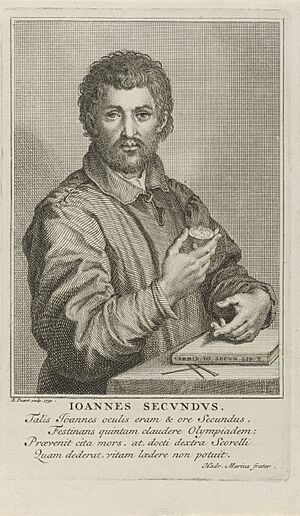Johannes Secundus facts for kids
Johannes Secundus (also known as Janus Secundus) was a talented Dutch poet who lived a short but creative life. He was born on November 15, 1511, and passed away on September 25, 1536. He wrote many poems in Latin, which was a common language for scholars and writers back then.
Early Life and Learning
Johannes Secundus was born Jan Everaerts in The Hague, a city in the Netherlands. His father, Nicolaes Everaerts, was a well-known lawyer and a friend of the famous scholar Erasmus.
In 1528, when Johannes was about 17, his family moved to Mechlin. It was there that he wrote his very first book of elegies, which are poems that often express sadness or reflection.
A few years later, in 1532, he traveled to Bourges with his brother Marius. They went there to study law under a famous teacher named Alciati. Johannes worked hard and earned his law qualification.
Working Life
In 1533, Johannes Secundus joined his other brother, Grudius, at the Spanish court of Emperor Charles V. This was a very important place where the emperor lived and worked.
Johannes spent two years there, working as a secretary for the Archbishop of Toledo. His job likely involved writing letters and managing documents. Sadly, he became ill and had to return to Mechlin. He passed away in September 1536 at the young age of twenty-four.
His Famous Writings
Even though he lived a short life, Secundus was a very productive writer. He created several books of elegies, which are reflective poems. He also wrote epigrams (short, witty poems), odes (lyrical poems), and verse letters.
His most famous work is called Liber Basiorum, which means Book of Kisses. This collection of nineteen poems was first fully published in 1541. In these poems, Secundus explored the idea of a kiss in many different ways.
He was inspired by ancient Roman poets like Catullus and also by poems from the Greek Anthology. His poems used ideas like kisses as a way to share feelings or as something that could heal. He also included ideas from Neo-Platonism, which is a philosophy about love and beauty.
Music and Influence
Johannes Secundus's poems were so popular that some were later turned into songs. For example, Cornelis Tijmensz Padbrué set some of his poems to music as madrigals in 1631.
The famous French writer Montaigne thought Secundus's Book of Kisses was as entertaining as other well-known works of his time, like those by Rabelais or The Decameron.
See also
 In Spanish: Johannes Secundus para niños
In Spanish: Johannes Secundus para niños
- Ariosto
- Claudian
- Propertius
- Sannazaro
- Satyricon
 | Leon Lynch |
 | Milton P. Webster |
 | Ferdinand Smith |


